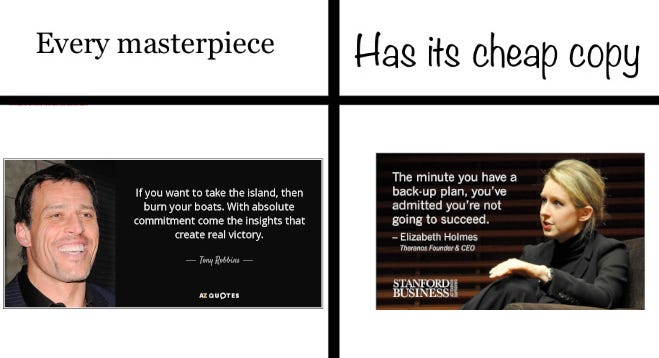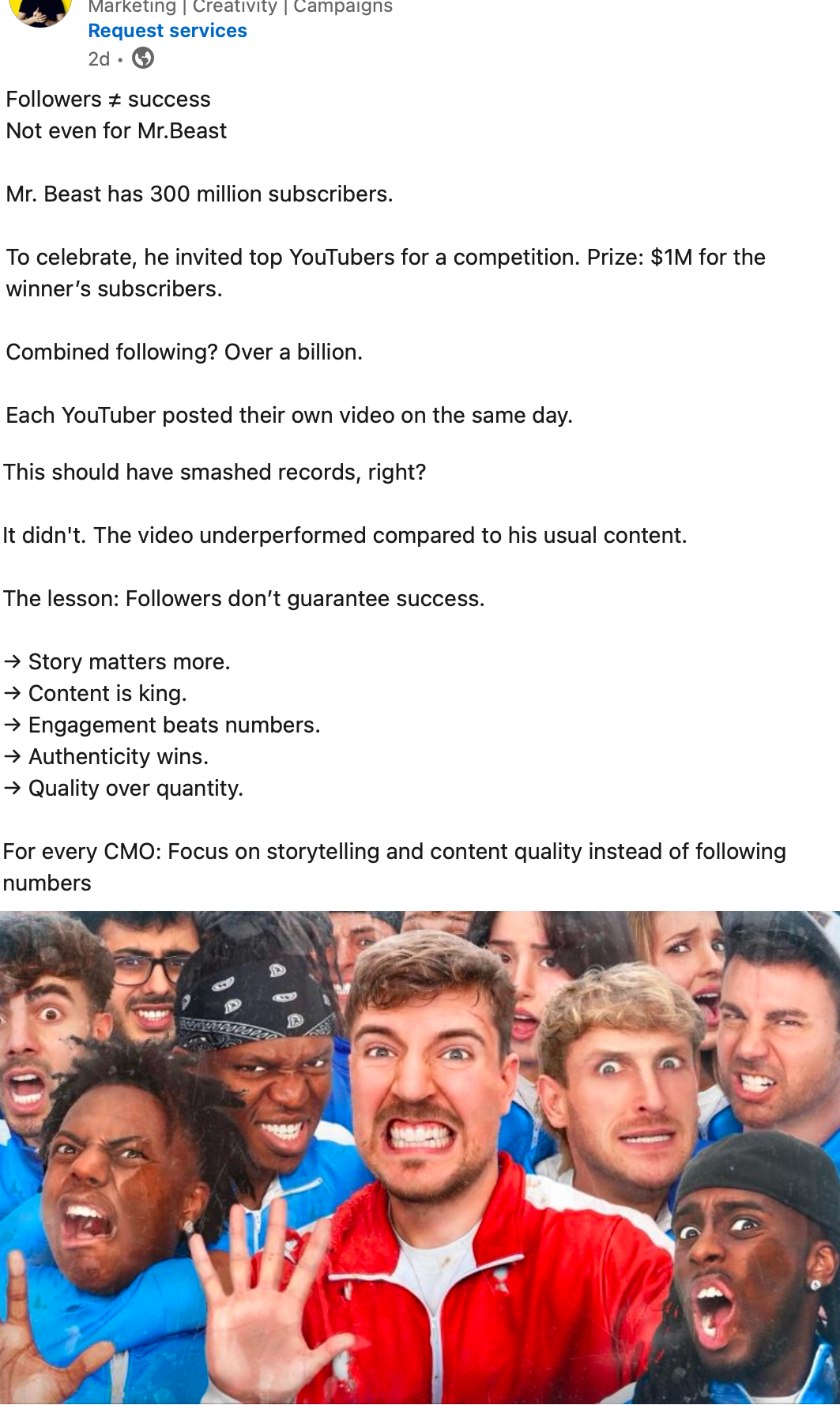“Do you love me?
Am I your cup of tea?
Or am I too unique?
I, I, I just gotta know”1
The internet is this bizarre place where individuality goes to die a slow, pixelated death.
I've had my fill of “just be yourself” ; ”stay authentic”; "build a community, not network”s. But let's face it: most of the time, beneath those shiny slogans lie inauthentic, self-centered pushes down their next big promo or sales funnel.
LinkedIn is definitely the main central. People who've decided that blending into the grey sludge, repeating generic mantras, bland content and stay-in-your-lane opinions, will give them an edge. Everyone follows set patterns, buzzwords, frameworks, and success stories that merge into one indistinguishable mass. I’ve seen plenty of “proven” copywriting frameworks, tales of "my startup’s success is thanks to hard work and team effort," and “would you believe what my kid taught me today?”2
It’s no wonder every platform is rushing to add “write with AI” functionalities— they clearly meet a demand. You can cost-effectively train an AI on a specific niche, and it'll churn out endless, hyper-targeted content— bagging racks with your digital meat grinder funnel while you sleep.
Algorithms reward content that gets likes and engagement, pressuring users to produce content that aligns with popular trends rather than genuine expression. So, popularity is often mistaken for authenticity, especially as shown by the LinkedInfluencer below who’s clearly viewing events from a pre-defined lense, surfing the trend-wave 🌊
You can look at MrBeast3 with THE EXAGGERATED SCREAMING, rapid-fire cuts and highly optimised strategies, and call it inauthentic, but remember, he literally is obsessed with his work. He’s said he has no hobbies outside of Youtube and understands the platform better than anyones else, not to mention he landed on his style through trial and error, refining his style and pushing boundaries, not copying others.
Whilst Binfluencers are lost in the sauce of the authenticity trend because “oh, lower views means people find it fake” and “if it doesn’t have personal story, engagement opportunities and quality, it’s inauthentic”. [Apparently, having custom set designs, meticulous planning, and the logistics of coordinating hundreds of very busy people worldwide is considered sub-par quality.]
“Authenticity" is turning into a commodity —craftable, marketable, and standardisable. When people online say, "Just be yourself," nobody actually wants you to be authentic, it actually means "make yourself likeable” - mold yourself into someone digestible for the masses.
I recently discovered the existence of Vtubers - virtual YouTubers who use animated digital avatars to interact with audiences. Even more shocking was learning about - agency networks, crafting personalities to complement existing rosters or meet audience expectations. Different strokes for different folks. The views for Vtubers are insane, showing that “being real” and genuine human interactions are not a prerequisite for engagement - you can’t even know if it’s a dude pretending to be a catgirl.
“Oh, they gonna love us
Oh, they gonna love us
We're beautiful, beautiful
Oh, they wanna kiss us
Oh, they wanna dress us
We're beautiful, beautiful”
So, is it a product of human nature or a broken reward-system that incentivises bad actors?
Historically, imitation has existed for centuries. So, it can be extrapolated as a feature of human nature, but imitation used to be hard work and often led to new ideas and directions. Now, it’s just a matter of seconds to repurpose Simon Sinek’s Ted Talk to B2B sales lessons or generate horrors beyond human comprehension.
Despite loud claims that AI will never replace genuine human vibes, certain indicators - such as the growth of popularity of platforms where you chat with an AI, people falling in love with them and the increasing prevalence of AI-generated content, clearly contradict the notion that authenticity and originality are needed.
And telling "get a personality" sounds harsh… but it looks like the only way to separate yourself from the AI-written slop. Especially as AI tends to yield homogenised outputs.
Maybe your unique personality with your quirks, imperfections, and hot-takes is the ultimate counter to the robot revolution. And, it still seems to work, be it through talking about Internet drama on Youtube as done by internet commentary channels, subcultures on IG and TikTok or specific interest Facebook groups.
The recent rise of small interest or skill-specific communities counters one-way communication. Instead of the need to be the loudest and most visible, people are waking up to a need for deeper, real human connections within smaller niche groups.4
So, are you optimising your creativity for machines or tuning it for human souls? At the heart of it all, it’s still a chase after companionship, inclusion and getting noticed. It’s not the technology and society to blame, but our pursuits with an ego-centric “me-me-me“ mindset that is the root of the problem - how do I get noticed, how to make my thing stand out, how to make people find me interesting… We’re all trying to clip ourselves to meet the imaginary projections of others.
In other words, we’re being mere mannequins in a factory.
And don’t even get me started on other platforms… Be it the echo-chambers of Facebook and Twitter (the real X is dead, R.I.P. XXXTentacion) or the lifestyle inflation of Instagram - influencers carefully curating their lives to maintain engagement with intentionally crafted narratives to appear genuine.
“Are you impressed
Do you like my dress
Am I worst or best
Oh wait, I don't really care”
This was written before his latest controversies, I haven’t caught up with those, but from what I’ve gathered, those do not relate to the points I’m making here.
Yet as all good things, my bet is that online micro-communities is a transitory trend that is going to die rather soon, but that’s an article for another week….








Great article, loved the questions asked and points raised.
Profound